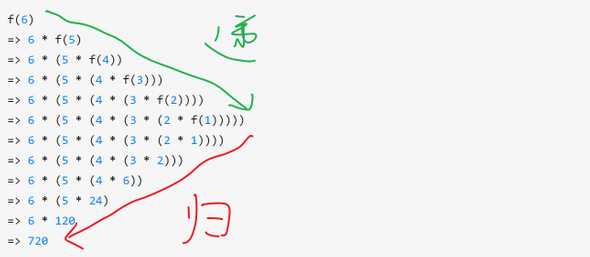ARTS 003
March 29, 2020
Algorithm
The Tribonacci sequence Tn is defined as follows:
T0 = 0, T1 = 1, T2 = 1, and Tn+3 = Tn + Tn+1 + Tn+2 for n >= 0.
Given n, return the value of Tn.
Example:
Input: n = 4
Output: 4
Explanation:
T_3 = 0 + 1 + 1 = 2
T_4 = 1 + 1 + 2 = 4Solution
题目是 easy 级别,只是解出来的话其实也很简单,但是涉及到的知识点其实非常多。
我第一想法是用递归:
class Solution {
public int tribonacci(int n) {
if (n == 0) return 0;
if (n == 1) return 1;
if (n == 2) return 1;
return tribonacci(n - 1) + tribonacci(n - 2) + tribonacci(n - 3);
}
}结果,一点都不意外的 Time Limit Exceeded.
于是改成了用循环来实现:
class Solution {
public int tribonacci(int n) {
if (n < 2) return n;
int first = 0, second = 1, third = 1, fourth;
while (n-- > 2) {
fourth = third + second + first;
first = second;
second = third;
third = fourth;
}
return third;
}
}效率很高,战胜了 100% 的 Java 提交。
这时想起尾递归效率比普通的递归会更高一些,正好这两天正在学习 kotlin,于是写了个 kotlin 的尾递归版本:
class Solution {
tailrec fun tribonacci(n: Int, first: Int = 0, second: Int = 1, third: Int = 1): Int {
return when(n) {
0 -> first
1 -> second
2 -> third
else -> tribonacci(n - 1, second, third, first + second + third)
}
}
}kotlin 语言有一些函数式的思想,所以又用 kotlin 的 sequence 实现了一个版本:
class Solution {
fun tribonacci(n: Int): Int {
val trib = sequence {
var terms = Triple(0, 1, 1)
while (true) {
yield(terms.first)
terms = Triple(terms.second, terms.third, terms.first + terms.second + terms.third)
}
}
return trib.take(n + 1).last();
}
}这道题还有更多解法,感兴趣的话可以看下这篇文章「面试官问你斐波那契数列的时候不要高兴得太早」。
这时候突然冒出来一个想法,到底什么是递归?于是开始搜索,看到下图后有种茅塞顿开的感觉:
递归和循环有着怎样的关系?可以看下这个问答「所有递归都可以改写成循环吗?」
另外,什么是尾递归呢?可以看下这个问答「什么是尾递归?」
我自认为暂时还没办法比这几篇文章讲的更好,所以就直接放链接了(这样做并不是一个好的学习习惯)。
Review
Coordinators Redux 前几天稀饭同学在工作规划里面提到了 iOS 端流程管理的问题,并附带了几个链接,顺藤摸瓜最终找到了 Coordinators Redux 这篇文章。
什么是流程管理呢?在客户端应用中,都会有各种各样的界面跳转逻辑,处理这些跳转逻辑的方式就是流程管理。iOS 和 Android 的开发框架其实都有提供相应的处理方式,但是都是非常基本的逻辑,作为系统提供的这么基础的框架,也不太可能会提供抽象层次更高的设计了,因为要综合考量各种业务复杂度的开发需求。那么当然也就有其不适用的场景,比如在界面跳转逻辑比较复杂、界面复用比较多的时候,Coordinator 这个设计思想,在这种复杂场景下就会更合适一些。
主要存在的问题:
- 冗长的 app delegates. App delegate 的设计的目的本来是为了用来 app 和系统层进行通信的,但是由于其在 app 中的中心位置,导致大家在开发时会把各种东西都给塞进去;
-
View Controller 承载了过多的职责。 也不知道哪些该做哪些不该做:
- Model-View Binding
- Subview Allocation
- Data Fetching
- Layout
- Data Transformation
- Navigation Flow
- User Input
- Model Mutation
- and many more besides
- 「顺滑的 flow」
- (void)tableView:(UITableView *)tableView didSelectRowAtIndexPath:(NSIndexPath *)indexPath {
id object = [self.dataSource objectAtIndexPath:indexPath];
SKDetailViewController *detailViewController = [[SKDetailViewController alloc] initWithDetailObject:object];
[self.navigationController pushViewController:detailViewController animated:YES];
} 这是一个常见的使用方式,可以看到,对于当前的 view controller 来说,需要去初始化 SKDetailViewController,还要用自己的父 controller 将初始化的 controller push 上去。这样相互之间有了过多的耦合,各自关注到了不该知道的事情,用作者的原话是:
It’s bossing its parent around. In real life, children should never boss their parents around. In programming, I would argue children shouldn’t even know who their parents are!
作者提出来的解决方案是用一个 coordinator 来承载这些流程工作,这样带来了非常多的好处,view controller 之间解耦了,也可以更好的复用了,所有的跳转逻辑都在 coordinator 中进行。而且,实现起来非常简单,不需要用什么框架或者库,只是一种思想而已。不过,我搜了下,找到了一个叫 RxFlow 的 swift 库,简单看了下,除了实现了 coordinator 模式外,还融入了一些响应式编程的思想。因为我没用 swift 做过实际的开发,所以暂时没办法客观的评价。
Tips
kotlin 的 inline扩展函数 + 后置 lambda 让代码更加的优雅,比如:
// Paint
mPaint = Paint().apply {
color = PAINT_COLOR
textSize = textSize
textAlign = Paint.Align.CENTER
strokeWidth = STROKE_WIDTH
strokeCap = Paint.Cap.ROUND
}Share
周末在家练习 kotlin,写了个简单的自动机,代码放在 github 上了。如果你像我一样不是计算机专业出身,写了多年代码后想了解一些计算机原理相关的知识,推荐看下《计算的本质》 这本书,不像其他经典巨著那样「晦涩」,对程序员特别友好,比较不容易放弃。
但是,为什么要学习这些这么难懂的东西呢?这里引用 Introduction to the Theory of Compution 前言的一段话,建议你耐心读完:
Theory is relevant to practice. It provides conceptual tools that practitioners use in computer engineering. Designing a new programming language for a specialized application? What you learned about grammars in this course comes in handy. Dealing with string searching and pattern matching? Remember finite automata and regular expressions. Confronted with a problem that seems to require more computer time than you can afford? Think back to what you learned about NP-completeness. Various application areas, such as modern cryptographic protocols, rely on theoretical principles that you will learn here.
Theory also is relevant to you because it shows you a new, simpler, and more elegant side of computers, which we normally consider to be complicated machines. The best computer designs and applications are conceived with elegance in mind. A theoretical course can heighten your aesthetic sense and help you build more beautiful systems.
Finally, theory is good for you because studying it expands your mind. Computer technology changes quickly. Specific technical knowledge, though useful today, becomes outdated in just a few years. Consider instead the abilities to think, to express yourself clearly and precisely, to solve problems, and to know when you haven’t solved a problem. These abilities have lasting value. Studying theory trains you in these areas.
Practical considerations aside, nearly everyone working with computers is curious about these amazing creations, their capabilities, and their limitations. A whole new branch of mathematics has grown up in the past 30 years to answer certain basic questions. Here’s a big one that remains unsolved: If I give you a large number—say, with 500 digits—can you find its factors (the numbers that divide it evenly) in a reasonable amount of time? Even using a supercomputer, no one presently knows how to do that in all cases within the lifetime of the universe! The factoring problem is connected to certain secret codes in modern cryptosystems. Find a fast way to factor, and fame is yours!
这些理论不是你想象的没用,反而是用来解决非常实际的问题的,而且不仅能解决实际的问题,还能提升我们的审美,有没有想过计算机是一个多么优雅的系统?同时,在学习的过程中还能锻炼我们的思维。
